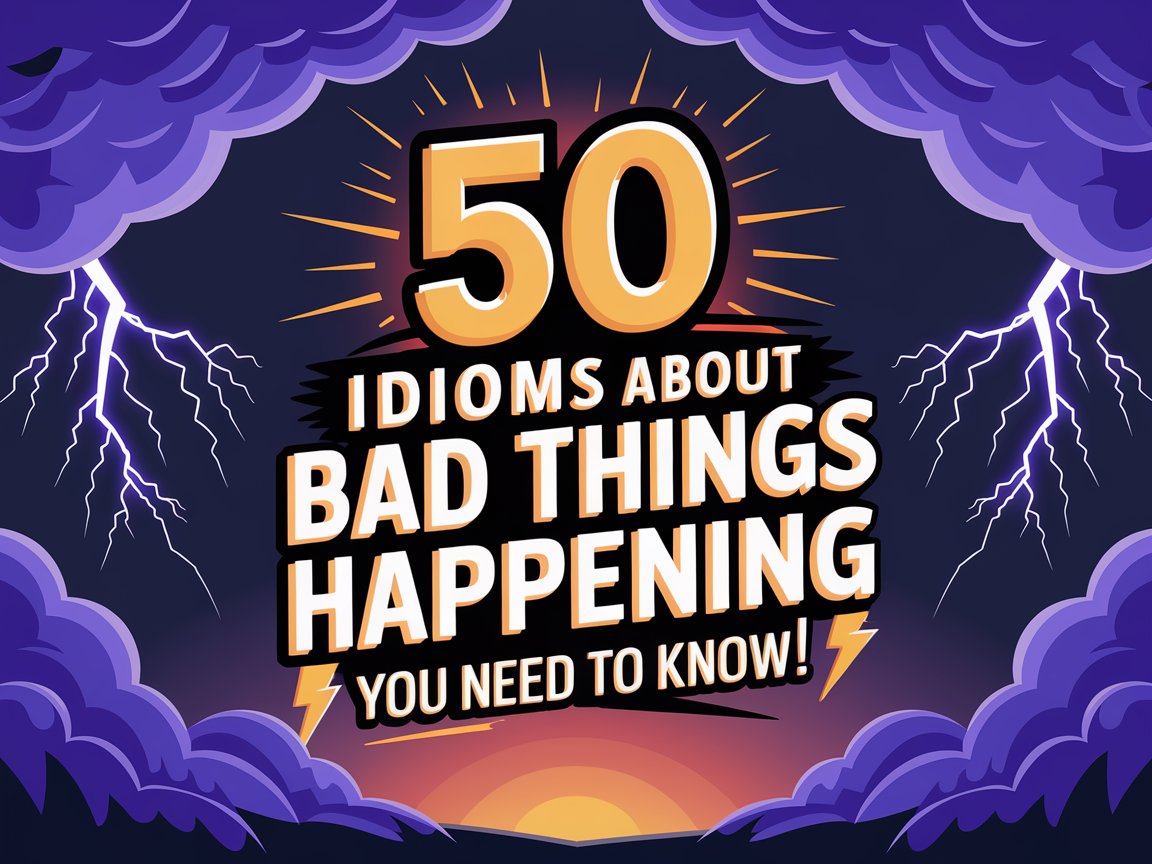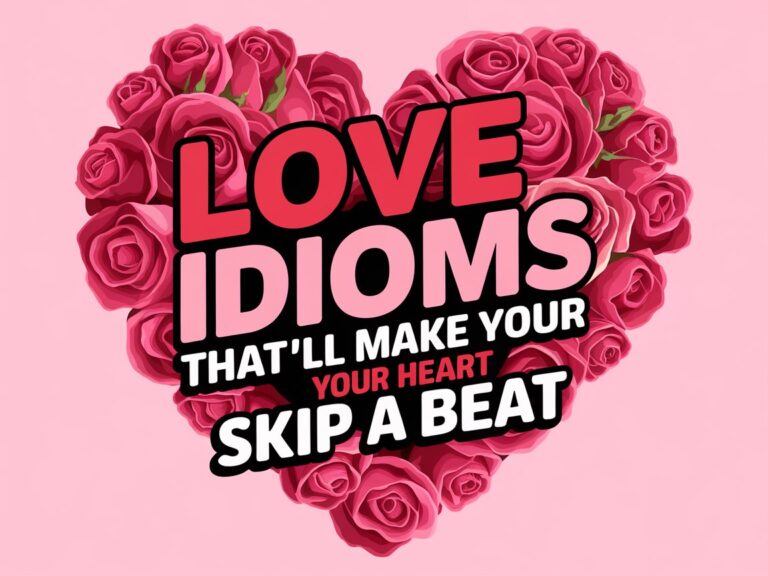50 Idioms About Bad Things Happening (You Need to Know!)

Bad luck strikes everyone, and English speakers have created hundreds of colorful idioms about bad things happening to describe life’s unfortunate moments. These expressions help us talk about misfortune, setbacks, and disasters in vivid, memorable ways that plain language just can’t match.
Authority Research on Idiom Knowledge
Recent linguistic research shows that idiom familiarity increases steadily throughout our lives, with most people continuing to learn new expressions well into their 50s and beyond. The study found that high-frequency idioms are more easily recognized and remembered, while low-frequency expressions remain challenging even for older speakers.
| Age Group | Average Idiom Recognition Rate |
|---|---|
| 20-30 years | 65% |
| 30-40 years | 78% |
| 40-50 years | 85% |
| 50+ years | 89% |
Understanding these expressions isn’t just about vocabulary – it’s about connecting with culture. When someone says “when it rains, it pours,” they’re not talking about weather. They’re sharing a universal human experience that resonates across generations.
🎯 Test Your Idiom Knowledge!
What does “add fuel to the fire” mean?
1. Add Fuel to the Fire
Making a bad situation even worse – that’s what this idiom is all about. When you add fuel to the fire, you’re not helping solve a problem. You’re making it bigger and more dangerous.
Think about a real fire. What happens when you throw gasoline on it? Whoosh! The flames get huge and out of control. That’s exactly what this expression means in everyday life.
Example: “Sarah was already upset about the meeting, so telling her the boss criticized her presentation just added fuel to the fire.”
Pro Tip: Use this when someone makes drama worse by saying or doing the wrong thing at the wrong time.
2. Back Against the Wall
When you’re trapped with no good options, you’ve got your back against the wall. This idiom comes from the idea of being cornered in a fight – literally having a wall behind you so you can’t escape.
Life puts us in these tight spots all the time. Maybe you’re facing a deadline with no time left, or dealing with a problem that seems impossible to solve.
Example: “With bills piling up and no job prospects, Jake really had his back against the wall.”
The phrase suggests desperation but also the potential for fierce fighting back – sometimes people perform their best when they have no choice.
3. Bite the Dust
This dramatic way to say “fail” or “die” comes from old Western movies. When cowboys got shot, they’d literally bite the dusty ground as they fell.
Today, we use it for anything that fails spectacularly – businesses, relationships, electronic devices, or plans that don’t work out.
Example: “My laptop finally bit the dust after five years of faithful service.”
It’s more colorful than just saying “broke” or “failed,” and it adds a touch of humor to disappointing situations.
4. When It Rains, It Pours
Bad things love company – that’s the message behind this popular expression. One problem leads to another, and suddenly you’re dealing with multiple disasters at once.
The weather metaphor is perfect. Light rain is manageable, but when it really pours, you get soaked instantly. Life works the same way with problems.
Example: “First my car broke down, then I got fired, and now my roof is leaking. When it rains, it pours!“
This idiom helps people feel less alone in their struggles. Everyone experiences those awful weeks when everything goes wrong simultaneously.
5. Face the Music
Time to accept the consequences of your actions. This idiom means confronting punishment, criticism, or unpleasant reality that you can’t avoid anymore.
The origin might come from military courts-martial, where accused soldiers faced a court while military band music played. Pretty intimidating!
Example: “After skipping work for three days, Maria knew she’d have to face the music with her boss.”
It implies courage and maturity – taking responsibility instead of running away from problems.
6. Throw in the Towel
Giving up completely when a situation becomes hopeless. This boxing idiom comes from a boxer’s corner throwing a towel into the ring to stop the fight and admit defeat.
Sometimes quitting is the smart choice. Not every battle is worth fighting, and knowing when to surrender can save you from worse damage.
Example: “After studying calculus for six hours straight, I finally threw in the towel and decided to ask for help.”
It’s different from just quitting – it implies you fought hard before admitting defeat.
7. Under the Weather
Feeling sick or unwell. This nautical expression comes from the idea that bad weather makes sailors seasick and miserable below deck.
It’s a polite, gentle way to say you’re not feeling good without going into embarrassing details about symptoms.
Example: “I won’t make it to the party tonight – I’m feeling a bit under the weather.”
Pro Tip: This is perfect for calling in sick to work. It sounds more professional than “I feel terrible.”
8. On Its Last Legs
Something that’s barely functioning and about to break down completely. The “legs” represent strength or support – when they’re weak, collapse is coming soon.
You can use this for machines, relationships, businesses, or even people who are exhausted.
Example: “My old washing machine is definitely on its last legs – it makes weird noises and barely cleans anything.”
It suggests you should start planning for replacement rather than trying to fix something that’s beyond repair.
9. Hit Rock Bottom
Reaching the lowest possible point in a bad situation. When you hit rock bottom, things literally cannot get any worse – which can actually be a relief.
The image comes from falling so far down that you finally hit solid rock. At least you’re not falling anymore!
Example: “After losing his job, apartment, and girlfriend in the same month, Tom felt like he’d hit rock bottom.”
Pro Tip: People often use this phrase when they’re ready to start rebuilding their lives.
10. Up a Creek Without a Paddle
Being stuck in a difficult situation with no tools or resources to fix it. The full phrase is often “up s*** creek without a paddle,” but the cleaner version works just as well.
Imagine being in a canoe going upstream with no way to steer or propel yourself. You’re basically helpless.
Example: “When my phone died and I realized I didn’t know anyone’s address by heart, I was up a creek without a paddle.”
11. Between the Devil and the Deep Blue Sea
Facing two equally bad choices where both options lead to trouble. This old maritime expression refers to being caught between dangerous supernatural forces and drowning.
Modern life is full of these impossible situations where every option has serious drawbacks.
Example: “I’m between the devil and the deep blue sea – if I take the promotion, I’ll never see my family, but if I don’t, we’ll struggle financially.”
12. In Hot Water
Being in serious trouble because of something you did wrong. Hot water burns, just like the consequences of bad decisions or mistakes.
This phrase suggests the trouble is your own fault, unlike some other idioms that imply bad luck.
Example: “Tommy was in hot water with his parents after they found out he’d been skipping school.”
13. At Wit’s End
Feeling completely frustrated and out of ideas for solving a problem. Your “wits” are your mental resources – when they’re exhausted, you’ve reached your limit.
This emotional state happens when you’ve tried everything you can think of and nothing works.
Example: “After dealing with her toddler’s tantrums all day, Jennifer was at her wit’s end.”
14. Behind the Eight Ball
Being in a disadvantaged or unlucky position. This pool/billiards term refers to a difficult shot where the eight ball blocks your target.
In life, it means circumstances are working against you through no fault of your own.
Example: “Starting college without a computer really put Marcus behind the eight ball compared to his classmates.”
15. In a Pickle
Finding yourself in a troublesome or awkward situation. Despite the silly sound, this idiom describes genuinely difficult circumstances that need careful handling.
Pickles are preserved in vinegar – sour and hard to get out of the jar, just like some problems.
Example: “When both my date and my ex showed up at the same restaurant, I was really in a pickle.”
16. In a Tight Spot
Being trapped in a difficult situation with limited options for escape. The physical image of being squeezed into a small space captures the feeling perfectly.
Unlike some idioms, this one doesn’t imply fault – sometimes life just puts you in impossible positions.
Example: “With rent due tomorrow and no money in the bank, Lisa found herself in a tight spot.”
17. Caught Red-Handed
Being discovered while doing something wrong. The “red hands” originally referred to blood on a murderer’s hands, making guilt impossible to deny.
Today it applies to any situation where someone’s guilt is obvious and undeniable.
Example: “The teacher caught Jimmy red-handed copying answers from his neighbor’s test.”
18. Barking Up the Wrong Tree
Pursuing the wrong solution or blaming the wrong person for a problem. Hunting dogs sometimes chase prey up trees, then bark at empty branches while the animal escapes elsewhere.
This mistake wastes time and energy while the real issue remains unsolved.
Example: “If you think I broke your phone, you’re barking up the wrong tree – I wasn’t even here yesterday.”
19. Dig Your Own Grave
Creating your own downfall through bad decisions or behavior. The vivid image of literally digging the hole where you’ll be buried is pretty dramatic.
It emphasizes personal responsibility for consequences that seemed avoidable.
Example: “By constantly arguing with customers, Derek was really digging his own grave at the restaurant.”
20. Jump from the Frying Pan into the Fire
Escaping one problem only to face something worse. The sequence matters here – you thought you were getting away from trouble, but actually made things more dangerous.
This happens when people make desperate decisions without thinking through all the consequences.
Example: “Quitting her stressful job seemed like a good idea until Sharon realized she’d jumped from the frying pan into the fire – now she couldn’t pay rent.”
21. Open a Can of Worms
Creating complicated problems by getting involved in something that seemed simple. Once worms escape their container, good luck getting them back in!
The idiom warns about unintended consequences of actions that can’t be easily undone.
Example: “Asking why the company’s budget was so tight really opened a can of worms about management’s questionable spending.”
22. Stir Up a Hornet’s Nest
Provoking angry reactions from multiple people by touching on a sensitive topic. Hornets are aggressive when disturbed and attack in swarms.
This usually happens when someone brings up controversial subjects without realizing how explosive they are.
Example: “Mentioning politics at the family dinner really stirred up a hornet’s nest.”
23. The Last Straw
The final problem that makes everything unbearable. From the phrase “the straw that broke the camel’s back,” it refers to the small thing that causes complete breakdown.
Often the “last straw” isn’t the biggest problem – it’s just the one that pushes someone past their breaking point.
Example: “Getting a parking ticket was the last straw after losing my keys, missing my train, and spilling coffee on my shirt.”
24. Go Down in Flames
Failing spectacularly and dramatically. The image comes from planes or buildings burning as they collapse – there’s no hiding this kind of disaster.
It suggests not just failure, but failure that everyone can see and remember.
Example: “The mayor’s re-election campaign went down in flames after the corruption scandal broke.”
25. Crash and Burn
Failing completely and suddenly after initial success or promise. Like a race car that crashes at high speed, the failure is both dramatic and final.
This often happens to people who take big risks or push too hard too fast.
Example: “The startup looked promising for six months, then crashed and burned when their main investor pulled out.”
26. Dead in the Water
Something that cannot succeed or continue functioning. Ships that lose power become helpless and drift – they’re still floating but going nowhere.
It describes projects, relationships, or plans that have lost all momentum and hope.
Example: “Without funding approval, the new school program was dead in the water.”
27. Dead on Arrival
Doomed to fail from the very beginning. Medical terminology describing patients who die before reaching the hospital, applied to hopeless situations.
Unlike other failure idioms, this one suggests the problems were fatal from day one.
Example: “The proposal to cut employee benefits was dead on arrival – nobody supported it.”
28. Bite Off More Than You Can Chew
Taking on more responsibility than you can handle. The physical image is perfect – stuffing too much food in your mouth makes eating impossible.
This usually happens to eager people who underestimate how difficult something will be.
Example: “Volunteering for three committees while working full-time meant Sarah had bitten off more than she could chew.”
29. Paint Yourself into a Corner
Creating a situation where all your options are bad ones. House painters who don’t plan their route can literally paint themselves into corners with no way out except walking on wet paint.
The key is that you created this problem through poor planning or short-sighted decisions.
Example: “By lying to both his parents and his girlfriend about where he was going, Mike had painted himself into a corner.”
30. Shoot Yourself in the Foot
Sabotaging your own success through careless words or actions. The image of accidentally harming yourself while handling a weapon captures the self-inflicted nature perfectly.
These mistakes are especially frustrating because they were completely avoidable.
Example: “Complaining about his boss on social media really shot Dave in the foot when it came to getting promoted.”
31. Cut Off Your Nose to Spite Your Face
Harming yourself while trying to punish someone else. This grotesque image emphasizes how stupid it is to hurt yourself just to make a point.
People do this when anger or pride overrides common sense.
Example: “Refusing to speak to her sister for ten years meant Mom cut off her nose to spite her face – she missed watching her nephews grow up.”
32. Burn Your Bridges
Destroying relationships or opportunities that you might need later. Armies used to burn bridges behind them to prevent retreat – making return impossible.
This usually happens during emotional conflicts when people say or do things they can’t take back.
Example: “Telling your boss exactly what you think of him might feel good, but it’s really burning your bridges.”
33. Cross the Line
Going too far and violating important boundaries or rules. Everyone has limits, and crossing those lines usually brings serious consequences.
The “line” represents social, legal, or personal boundaries that shouldn’t be violated.
Example: “Making jokes about religion was fine, but mocking people’s personal tragedies really crossed the line.”
34. Step on Someone’s Toes
Offending or interfering with someone, usually unintentionally. Like accidentally stepping on someone’s foot, it causes pain and annoyance.
This often happens when people don’t realize they’re entering someone else’s territory or area of responsibility.
Example: “I didn’t mean to step on your toes by reorganizing the files – I thought I was being helpful.”
35. Ruffle Feathers
Disturbing or annoying people by challenging the status quo. Birds get agitated when their feathers are disturbed, just like people react poorly to unwanted changes.
Sometimes ruffling feathers is necessary for progress, but it always creates temporary problems.
Example: “The new manager’s efficiency suggestions really ruffled feathers among the long-time employees.”
36. Rock the Boat
Causing trouble by challenging established ways of doing things. Boats need stability – rocking them makes everyone uncomfortable and potentially dangerous.
This idiom often describes people who ask difficult questions or suggest unpopular changes.
Example: “I know you don’t want to rock the boat, but someone needs to address the safety violations.”
37. Upset the Apple Cart
Disrupting carefully planned arrangements. Apple carts need to be balanced perfectly – one wrong move and fruit rolls everywhere.
The disruption is usually sudden and affects multiple people or projects at once.
Example: “The client’s last-minute changes really upset the apple cart for our production schedule.”
38. Let the Cat Out of the Bag
Accidentally revealing secrets that were supposed to stay hidden. Medieval markets sometimes substituted cats for piglets in bags – letting the cat out exposed the fraud.
The revelation usually causes problems for someone who wanted the information kept private.
Example: “Jimmy let the cat out of the bag about the surprise party when he asked Mom what time to arrive.”
39. Spill the Beans
Revealing secrets or information that should have stayed confidential. Ancient Greeks voted by dropping beans into containers – spilling them would reveal the secret votes.
Unlike “letting the cat out of the bag,” this can be either accidental or intentional.
Example: “The reporter finally got someone inside the company to spill the beans about the cover-up.”
40. Put Your Foot in Your mouth
Saying something embarrassing or inappropriate at the worst possible moment. The physical impossibility of the action matches how awkward these verbal mistakes feel.
Everyone does this occasionally, especially when nervous or trying to be clever.
Example: “I really put my foot in my mouth when I asked about her husband right after she mentioned getting divorced.”
41. Stick Your Foot in It
Making an embarrassing mistake in speech or behavior, similar to putting your foot in your mouth but often more serious.
The “it” usually refers to something messy that’s hard to clean up – like the social awkwardness that follows.
Example: “He really stuck his foot in it by bringing up politics at his girlfriend’s family dinner.”
42. Get Caught with Your Pants Down
Being discovered unprepared in an embarrassing situation. The literal image suggests being caught in a vulnerable, undressed state.
This happens when people are lazy, overconfident, or simply unlucky with timing.
Example: “The surprise audit caught the accounting department with their pants down – their records were a complete mess.”
43. Fall Flat on Your Face
Failing embarrassingly in a very public way. The physical image of tripping and falling face-first captures both the pain and humiliation.
These failures are especially memorable because they happen in front of other people.
Example: “My attempt at stand-up comedy fell flat on its face – nobody laughed at a single joke.”
44. Come Apart at the Seams
Breaking down completely under pressure or stress, like a poorly made garment that splits where it’s sewn together.
This can apply to people, relationships, organizations, or plans that can’t handle the demands placed on them.
Example: “After three major clients canceled their contracts, the small agency began to come apart at the seams.”
45. Go to Pieces
Losing emotional control or falling apart psychologically. The image suggests something solid breaking into fragments that can’t function together.
This often happens during extremely stressful periods when people’s coping mechanisms fail.
Example: “When she heard about the accident, Maria just went to pieces and couldn’t stop crying.”
46. Fall to Pieces
Similar to “go to pieces,” but can apply to both emotional breakdown and physical deterioration of objects or situations.
The emphasis is on the complete collapse of something that was once whole and functional.
Example: “Their marriage fell to pieces after the financial problems started.”
47. Go Haywire
Malfunctioning badly or behaving in unpredictable ways. “Haywire” was cheap, tangled wire that caused problems when it broke or got twisted.
This idiom works for both mechanical problems and situations that spin out of control.
Example: “The computer system went haywire during the big sale, and customers couldn’t complete their purchases.”
48. Go South
Getting worse rapidly or failing completely. The direction “south” suggests decline, like temperatures dropping or stock prices falling.
It’s a casual way to describe situations that deteriorate quickly and dramatically.
Example: “The team’s performance really went south after their star player got injured.”
49. Take a Turn for the Worse
Declining significantly after a period of stability or improvement. This medical terminology describes patients whose conditions suddenly deteriorate.
The phrase applies to any situation that was stable or improving but then becomes significantly worse.
Example: “The company’s finances had been improving, but they took a turn for the worse when the lawsuit was filed.”
50. Go from Bad to Worse
Continuous deterioration where each development makes the situation more difficult than before.
Unlike sudden disasters, this describes a gradual slide where problems multiply and compound each other.
Example: “First he lost his job, then his car broke down, and when his wife left him, things really went from bad to worse.”
Frequently Asked Questions
Q: Why do English speakers use so many idioms about bad things happening?
A: Humans naturally use colorful language to cope with difficult situations. These idioms help us express complex emotions and shared experiences in memorable ways that plain language can’t match.
Q: Are these idioms appropriate for formal writing or business communication?
A: Most of these expressions are casual and work better in informal settings. For professional communication, choose milder idioms like “face the music” rather than “up s*** creek without a paddle.”
Q: How can I remember all these different idioms?
A: Focus on the visual images each idiom creates. “Painting yourself into a corner” and “shooting yourself in the foot” are easier to remember when you picture the actual scenarios.
Q: Do other languages have similar expressions about misfortune?
A: Yes! Most cultures develop colorful ways to describe bad luck and difficult situations, though the specific images and metaphors vary based on cultural experiences.
Q: When should I use these idioms instead of plain language?
A: Use idioms to add color to storytelling, connect with others who share the cultural reference, or make light of difficult situations. They’re especially useful when you want to sound more natural and conversational.
Conclusion
Life serves up plenty of challenges, but English gives us amazing tools to talk about them. These 50 idioms about bad things happening prove that humans have always found creative ways to discuss misfortune, failure, and setbacks.
Here’s something interesting that most people don’t realize: using these expressions actually helps us cope better with problems. When you say “when it rains, it pours” instead of “I’m having multiple problems,” you’re connecting with centuries of human experience. You’re reminding yourself that others have faced similar challenges and survived.
The next time you’re dealing with difficulties, try using one of these idioms. You might find that putting your troubles into colorful language makes them feel a little more manageable – and gives you a way to share your experience that others will instantly understand and relate to.
Helpful Resources
- https://www.frontiersin.org/journals/communication/articles/10.3389/fcomm.2019.00029/full
- https://www.espressoenglish.net/100-idioms-meanings-examples/
- https://idiominsider.com/idioms-about-bad-things-happening/
- https://www.verbling.com/articles/post/5-american-english-idioms-to-use-when-things-go-wrong-559ed5e6448aa5ca55a11572






